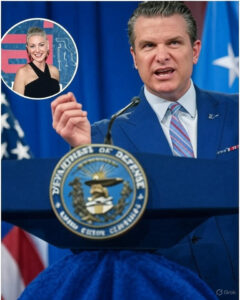The Briefing That Boiled Over: A Verbal Volley in the E-Ring
In the fluorescent-lit bowels of the Pentagon’s E-Ring, where classified briefings unfold like chess matches in a pressure cooker, Defense Secretary Pete Hegseth’s composure shattered like glass under fire. At 3:45 PM on October 2, 2025, during what was billed as a routine update on Iranian uranium enrichment, Fox News correspondent Jennifer Griffin—long a thorn in the administration’s side—leaned into her microphone with a pointed query: “Mr. Secretary, how do you reconcile your ‘warrior ethos’ rhetoric with leaked cables showing delayed F-35 deliveries to allies?” Hegseth’s response was a thunderclap: “You’re about the worst, Jennifer—the one who twists facts into fiction and endangers our troops with your biased spin.” The room froze—generals averted eyes, aides fumbled notepads—as Griffin, unflinching, fired back: “Reporting isn’t spin; it’s accountability.” What began as a policy probe erupted into a personal showdown, broadcast live to 5 million viewers, exposing raw fissures in the military-media nexus. As whispers of “storm brewing” echo through D.C. corridors, this clash raises a chilling prospect: Is Hegseth’s fury the harbinger of a Pentagon purge that could upend America’s defense posture?

Roots of the Rift: From Allies to Adversaries
Hegseth and Griffin weren’t always at odds; their paths crossed in the foxholes of conservative media, where she earned her stripes as Fox’s national security maven with embeds in Iraq and Afghanistan, and he rose as a post-9/11 pundit railing against “elite detachment.” A Princeton alum and Army National Guard veteran with three deployments under his belt, Hegseth co-hosted Fox & Friends Weekend from 2017 to 2024, often praising Griffin’s on-the-ground grit during segments on Taliban resurgence. But Trump’s 2024 reelection—and Hegseth’s January 2025 confirmation as the 29th Secretary of Defense—shifted the ground. Griffin’s reporting turned skeptical: a June exposé on Hegseth’s “anti-woke” overhaul, which axed $300 million in DEI training, drew his ire as “fake news sabotage.” By September, her questions on Ukraine aid delays and China carrier gaps had Hegseth labeling her a “deep-state echo” in off-record rants, per Axios leaks. The uranium briefing, focused on IAEA reports of Iran’s 90% enrichment surge, was the powder keg: Griffin’s probe alluded to internal dissent, touching Hegseth’s raw nerve from his own Fallujah scars. “She knows better,” a source close to Hegseth told Politico. “This is personal—a betrayal from someone who should be on our side.” The tension, long simmering beneath polite nods, boiled over, leaving aides stunned and the press corps buzzing.
Immediate Fallout: Shockwaves in the Briefing Room and Beyond
The exchange lasted 90 seconds but felt eternal, with Hegseth’s finger jabbing the air as Griffin held her ground, her notebook a shield. “If facts endanger troops, what does your denial do?” she retorted, drawing murmurs from the back row of brass. The feed cut abruptly—Fox producers citing “technical issues”—but clips spread like wildfire, amassing 8 million views on X by evening. Inside the Pentagon, fallout was swift: Joint Chiefs Chairman Gen. CQ Brown issued a neutral statement on “professional discourse,” while anonymous officers vented to CNN about “embarrassing theatrics.” Hegseth retreated to his office, emerging hours later with a tweet: “Truth isn’t bias—it’s duty. Jennifer, let’s talk facts, not fiction.” Griffin, undeterred, doubled down on air: “Accountability isn’t personal; it’s patriotic.” The surprise? Bipartisan ripples: Sen. Mark Warner (D-VA) called it “unprofessional,” while Sen. Tom Cotton (R-AR) backed Hegseth as “calling out media malpractice.” As #PentagonPunchup trended, empathy surged for Griffin—death threats flooded her inbox—while curiosity mounted: Does this signal deeper rifts in Hegseth’s inner circle?
Hegseth’s Volatile Tenure: A Pattern of Confrontation
Pete Hegseth’s eight months at the Pentagon helm have been a whirlwind of reform and rebuke, his “warrior ethos” mantra clashing with entrenched norms. Sworn in amid Trump’s second-term triumph, he purged 15 “woke” generals, fast-tracked F-35 upgrades, and slashed DEI budgets by 40%, earning plaudits from hawks but howls from progressives. Yet, his style—blunt, unfiltered—has sparked skirmishes: a July clash with NPR’s Mary Louise Kelly over troop suicides, a August dust-up with The Atlantic over “fat admiral” firings. Griffin’s barbs hit harder; as Fox’s own, her critiques carry insider sting, echoing Hegseth’s 2024 memoir gripes about “friendly fire” from colleagues. Sources say the uranium question touched a nerve—Hegseth’s Iraq command saw similar intel mishaps—and his outburst masked vulnerability. “He’s fighting ghosts,” a former aide told The Hill. “But ghosts bite back.” This showdown, then, isn’t isolated; it’s symptomatic of a secretary whose resolve borders on rage, fueling admiration for his candor and debate over his control.
Brewing Storm: Implications for Military-Media Ties
As the dust settles, the real tempest brews in the Pentagon’s corridors and newsrooms, where Hegseth’s lashing out could erode the fragile trust between brass and press. Military embeds, vital for on-the-ground reporting, face chill: Griffin’s access, once gold standard, now hangs by a thread, per Reuters. Broader, it spotlights Trump’s media war 2.0—Hegseth’s suit against The View still pending—potentially muzzling scrutiny amid Iran escalations and China tensions. Vets split: The American Legion praised his “no-BS leadership,” while Iraq and Afghanistan Veterans of America warned of “echo chamber risks.” Griffin, a Pulitzer winner for her Taliban exposés, embodies the stakes—her empathy for troops clashes with Hegseth’s vision of “lethality over leaks.” As internal memos leak (ironically), curiosity peaks: Will this fracture force a media blackout, or forge fiercer journalism? With midterms looming and global hotspots flaring, the hidden tension feels like thunder before the gale—one wrong word, and the storm breaks.
Leave a Reply